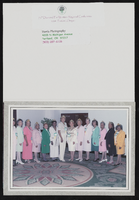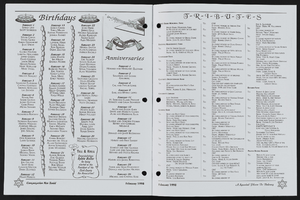Search the Special Collections and Archives Portal
Search Results
UNLV Libraries Collection of Hollywood Casino Corporation Promotional Materials and Reports
Identifier
Abstract
The UNLV Libraries Collection of Hollywood Casino Corporation Promotional Materials and Reports includes annual reports, prospectus, 10-K forms, 10-Q forms, equity reports, financial research, press releases, press kits, a stockholder meeting notice, and promotional materials for Hollywood Casino Corporation in Dallas, Texas, dating from 1992 to 2001.
Archival Collection
Jon E. Cobain Papers
Identifier
Abstract
The Jon E. Cobain Papers (1963-2009) contains material representing Cobain's experience as the first official graduate of Nevada Southern University (later University of Nevada, Las Vegas) in 1964. Materials include photographs of Cobain and his family, a scrapbook from his 1964 graduation day, newsletters, a copy of Beau's Bits Handbook, personal correspondence, and his diploma. This collection is comprised exclusively of digital surrogates.
Archival Collection
Stella Champo Iaconis Papers
Identifier
Abstract
The Stella Champo Iaconis Papers consist of a certificate for proficiency in Rapid Legible Business Writing from the Palmer Method of Business Writing given on May 11, 1927; a certificate of promotion to high school in Clark County, Nevada dated May 25, 1927; and an autograph book signed by classmates at Las Vegas High School in Las Vegas, Nevada in 1928.
Archival Collection
Joseph LaMar Foremaster Photograph Collection
Identifier
Abstract
The Joseph LaMar Foremaster Photograph Collection includes black-and-white photographic prints and negatives of structures at the Old Ranch (Stewart Ranch) in Las Vegas, Nevada from approximately 1920 to 1939 when the Foremaster family lived and worked on the land.
Archival Collection
Aaron Williams Photograph Collection
Identifier
Abstract
The Aaron Williams Photograph Collection (approximately 1968 to 1983) consists of three black-and-white photographic prints. Two of the images are of the groundbreaking ceremony of the Senior Citizens’ Center with Las Vegas, Nevada Mayor Oran Gragson, and the third of three unidentified individuals.
Archival Collection

Sanje Sedera oral history interview: transcript
Date
Archival Collection
Description
Oral history interview with Sanje Sedera conducted by Kristel Peralta, Cecilia Winchell, Ayrton Yamaguchi, and Stefani Evans on April 16, 2021 for Reflections: The Las Vegas Asian American and Pacific Islander Oral History Project. Sanje Sedera discusses growing up in Sri Lanka, formerly Ceylon, with his family. He shares his educational history, moving from Sri Lanka to Darwin, Northern Territory, Australia as a high schooler to learn English before immigrating to the United States to attend Idaho State University. Sedera discusses the political unrest and civil war that took place in Sri Lanka between the Tamil and Sinhalese people, and how he grew to appreciate political activism instilled in him by his paternal grandparents. Sedera shares his employment history working as a manager for K-Mart, an opportunity that brought him to Las Vegas, as well as his entrepreneurial pursuits of owning a mortgage business and becoming a realtor. He talks about the financial crisis of 2008 that led to losing his business, his attempts to run for public office, and how he helped to form Nevada's Asian American Democratic Caucus. Sedera concludes with a discussion of his Buddhist practice and how these philosophies have shaped his life.
Text

Alpha Kappa Alpha Sorority 75th Far Western Region conference materials
Date
Archival Collection
Description
From the Alpha Kappa Alpha Sorority, Incorporated, Theta Theta Omega Chapter Records (MS-01014) -- Chapter records file.
Text

Transcript of interview with Billy Paul Smith by Claytee White, October 3, 2013
Date
Archival Collection
Description
Chemist, mathematician, and health physicist Billy Paul Smith donates time to tutor young people in hopes of attracting more youth into the fields of math and science. Born in 1942 and schooled in segregated black schools in Shreveport, Louisiana, and Texarkana, Texas, he graduated from high school at age fifteen and enrolled at Prairie View A&M University, where he trained with the Reserve Officer Training Corps (ROTC) and earned his Bachelor’s degree in chemistry and in 1964 his Master’s degrees in chemistry and math. Most young U.S. Army officers in 1964 went to Vietnam, but Billy’s math and science background steered him to the Army Chemical Corps, where he was quickly selected to join a new team. The team was to develop responses to nuclear weapon accidents and worked under the Defense Atomic Support Agency (DASA) in Albuquerque, New Mexico. At the same time, Billy completed the Weapons Ordinance Army course on classified information relating to the U.S. nuclear weapons arsenal. In this interview, Billy talks about his service with DASA and his subsequent twenty-seven years working at the Nevada Test Site in a variety of positions with Reynolds Electrical and Engineering Company, Inc. (REECo), a company that had “percentagewise more blacks in management positions than any other [Las Vegas] company.” He experienced the quiet racism of Las Vegas residential segregation when he tried to purchase a house in a neighborhood he liked and the unexpected kindness of the REECo general manager, Ron Keen, who made sure the Smith family could live where they wanted to live. He talks about Area 51 and explains underground testing activity and offers the scientific and ecological reasons why scientists deemed Yucca Mountain safe to store nuclear waste. After retiring at fifty-two, Billy and a colleague formed an independent instrumentation company, which, from 1995–2005 provided and calibrated radiological measurement and detection instruments for the decommissioning and closure of the Rocky Flats nuclear plant in Golden, Colorado. During that time, Billy rented an apartment in Boulder, but he and Jackie maintained their Las Vegas home, where they still reside. Billy shares memories of places he and his wife used to enjoy on the Westside and tells of their longtime friends in the black community. He also talks about developing his philosophy of philanthropy through Alpha Phi Alpha Fraternity and discusses becoming a member of the Knowledge Fund Advisory Council for the Governor’s Office of Economic Development (GOED) and the advisory council for the Nevada System of Higher Education.
Text

Transcript of interview with Dennis Ortwein by Claytee White, May 6, 2009
Date
Archival Collection
Description
Dennis Ortwein arrived in Las Vegas in 1956. He shares many details about growing up in Montana, his parents and siblings, his education, and the moment in time when he was offered an opportunity to work in Las Vegas. He also lays out the path his singing career took, starting with school plays, duets with his sister, and high school quartets. Once in Las Vegas, Dennis taught for a while, served as principal, and was involved in creating programs that helped integrate schools. He also talks about his church choir work, entertainment in early Las Vegas, above-ground testing at the Nevada Test Site, and anti-nuclear protests. Dennis served as lab school and student teaching coordinator in Nigeria. He offers several anecdotes and stories about the time he and his family spent there. After retiring early (age 53), Dennis acted as consultant to the Esmeralda County school board, executive director for the National Conference of Christians and Jews, and wrote a book. He is currently enjoying his singing career by appearing at conventions, in musicals, and at weddings and memorials.
Text

